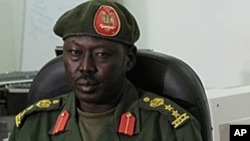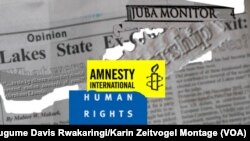South Sudanese journalists have had another warning from offiicals about how they cover stories. This time, the military has told them not to report on security matters without first obtaining clearance from the office of the SPLA spokesman.
“The military command has issued an announcement that no media is allowed to broadcast or print any information related to the security or to the military without ascertaining the correct facts from the command,” SPLA spokesman Philip Aguer said.
He warned that journalists who fail to get their work checked by his office will end up in court.
"Without authorization from the military, you are in trouble. We will take you to court," Aguer said.
The order, which was issued last week, is aimed at ensuring that correct information about security affairs is made available to the public, Aguer said.
Without going into detail, Aguer said some media houses have misreported stories involving the security forces and have cited unofficial sources in their stories. Those stories have sometimes caused panic, he said.
Aguer said that until the SPLA has spokespersons for each of the army's divisions, all verification of military-related stories will be handled by his office.
"We are centralizing the information and we talk on behalf of the commander…If it is a civil nature, a conflict or something to do with the police, the police has their own spokesman on their side,” he said.
Citing rebels
But in what appeared to be an about-face from earlier warnings from the government to reporters, Aguer said the military would "not have a problem with you... if you quote from the rebels.”
South Sudan Information Minister Michael Makuei has said that journalists who broadcast or publish the views of rebels are agitators and law-breakers, and could end up in court.
Journalists' union reacts
The chair of the South Sudan Union of Journalists, Oliver Modi Philip, said it was important for journalists to be careful when reporting on security matters.
"Reporting about military activities demands information that can be verified by the journalists as well as personnel who are responsible for the dissemination of the information,” he said.
A popular radio station was shut down in August for a story that the government said blamed the SPLA for a new outbreak of violence in Unity state.
At around the same time as the radio station was taken off the air, the Committee to Protect Journalists (CPJ) called on the government to stop harassing journalists.
CPJ East African Representatibve Tom Rhodes said that government threats and harassment of reporters are leading journalists in South Sudan to self-censor their work at a time when the country needs accurate reporting.
In a joint report released in August, human rights groups Amnesty International and Human Rights Watch said the authorities in South Sudan, "...especially the National Security Service (NSS) have harassed, intimidated, and arbitrarily detained journalists."
Journalists “cannot report freely on the ongoing conflict and newspapers are unable to participate in open debate on how the country could move towards sustainable peace without fear of retribution by state security forces,” the report said.
New media laws
The military directive to run stories by the SPLA spokesman's office for approval comes a month after President Salva Kiir signed three media bills into law.
The new laws are supposed to give all citizens, including journalists, easier access to official information, set up an independent oversight committee of the media, and start an independent national public service broadcast service.

